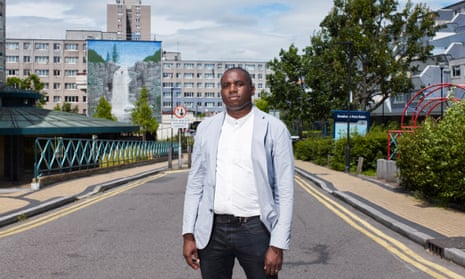In the fortnight since the pictures of Grenfell Tower in flames first flickered on our phone screens, and the skeletal high-rise became the insistent retinal image in our public life, David Lammy’s has been the most unguarded political voice of outrage at the fire and its aftermath. The Labour MP for Tottenham set the terms for that anger when he appeared on the Today programme, while the fire itself was still raging, to suggest that “this is the richest borough in our country treating its citizens in this way, and we should call it what it is, it is corporate manslaughter… ”
While voices for the local authority, Kensington and Chelsea, and the government were insisting on describing the fire as “a tragedy”, as if it were a natural disaster or an act of God, Lammy stood up in the House of Commons to insist again that it was first and foremost a crime, and to challenge the prime minister to reveal details of the police investigation.
Then, on Monday of last week, Lammy appeared on Newsnight to expand on his belief, first expressed on social media, that the victims of the fire numbered “far, far more” than the then confirmed 79. That “residents saw dozens of people jumping out of windows to escape the fire. Bodies piled up in stairwells and corridors” and that “speaking to people on the ground, there is huge suspicion of a cover-up… with information being withheld for political reasons in an attempt to avoid fuelling anger or unrest… [which] is frankly outrageous.” Though he did not provide supporting evidence for these claims – how could he? – when pressed by Emily Maitlis on Newsnight, he stood by the people who made them.
Over the course of those days I spoke twice at length to Lammy. First in an office in Portcullis House next to the Houses of Parliament, when news was emerging of “at least 600” other towers that may be clad in the same or similar combustible panels, including one in the MP’s own constituency. And second last Wednesday, when Lammy was on the way in his car to the funeral of 24-year-old artist Khadija Saye, who died with her mother on the 20th floor of Grenfell Tower, and who had been a close friend of Lammy and his wife, Nicola Green.
The first time we talked, a week after the fire, Lammy described how the news had first unfolded for him. How he had been up as usual that Wednesday morning at about 6.30, checking his phones, and saw the image of the inferno in the half-light.
“I knew Grenfell Tower,” he said. “I used to visit family near there. In the black diaspora in London there have always been close links between the communities in Tottenham, Brixton and north Kensington. I have many family and friends in social housing. So the chances were I knew someone in these buildings.”
What Lammy did not expect that morning was to step back into his bedroom and find the phone of his wife – who had not grown up with those same community links – buzzing with messages. Green, also an artist, had been working with Khadija Saye on an exhibition at the Venice Biennale, which featured work by both women. Lammy woke his wife up and she scrolled through her messages. That was the start of long hours that had them ringing around for news of Saye and her mother and praying that they would be found among those being treated in hospital.
That afternoon, during a victory party Lammy had arranged for his local constituency workers – the election had only been six days earlier – he saw news on Facebook that suggested Saye had been found alive, which briefly lifted everyone’s spirits. It turned out to be a false hope, however. The next morning his friend was the second person confirmed to have died.
“We had told the police how she always wore this distinctive African bracelet,” Lammy recalled. “I don’t know if that helped in the identification, but what I do know is that the call I made to her father that day will never leave me. I have seen a lot in politics. I have sat with families who have lost children to knife crime. I was with families who had lost everything in the 2011 riots. But speaking to Khadija’s father was one of the toughest things. I said, you know, how are you doing? And he told me simply, ‘she was my only daughter’. And then he talked about how he had to go and visit her at the morgue later, and was preparing himself for what he would see there as well as he could. I have a daughter and the idea of that was just heartbreaking, of course.”
Describing this phone call, Lammy choked briefly with tears, and then collected himself. “One always has to look for hope,” he said, “but sometimes there are dark places where you just can’t find it. And if there isn’t hope there has to be justice.”
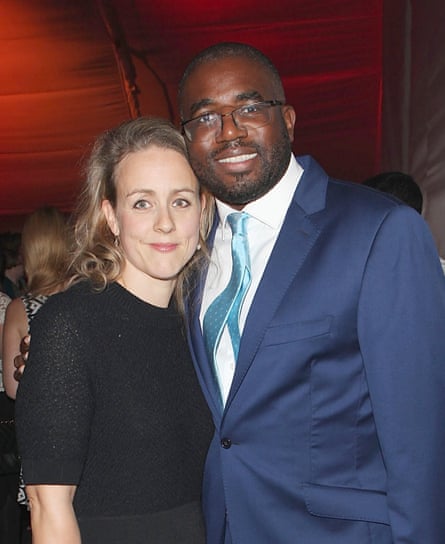
Listening to Lammy, 44, talk about the tower and the response of the council and government, that morning, with those emotions still raw, sounded like an object lesson in how the personal becomes political. There have been other moments in Lammy’s 17 years as an MP – he was elected to his seat in the Commons aged 27 after the death of Bernie Grant – when he has been moved to lead on the story, notably in the Tottenham riots of 2011. He felt the same thing this time around.
That understanding prompted him to react quickly to try to frame what we were watching on our screens. “People have talked about this being about poverty,” he says. “I didn’t recognise that. The people living in Grenfell Tower, the people living in social housing in Britain, I would not describe as the poorest. They are the lucky ones in many ways. The poorest in our country are living in overcrowded private rental housing or bed and breakfasts or hostels. This terrible story doesn’t even get to the insecurities of their lives. If you are in social housing generally you have a chance. You have the potential for stability, which is what I had growing up. We were poor but we were stable. We stayed in the same house throughout my childhood. That stability is everything. I knew these people in Grenfell Tower, know exactly who they are, they are cleaners, they are porters, they are care assistants, maybe teaching assistants. People doing two, three jobs, working nights. They are people like my mum.”
Though he has travelled a long way from the Tottenham of his childhood – first on a choral scholarship to the King’s school, Peterborough, then university in London and at Harvard, a brief career as a barrister, then into parliament – Lammy still uses that original connection with the community that is now his constituency as his touchstone. He understands Grenfell as a story therefore not about poverty but about agency, about a catastrophic breakdown in local accountability.
“Even in the 70s and 80s when my mother picked up her pay packet every Friday from Tottenham town hall,” he says, “there was a proper civic society, we had a civic glue. A lot of that has gone.”
In Lammy’s view, councils like Kensington and Chelsea simply don’t know how to do civic any more. “They believe they are there for the upper middle class folk of Notting Hill, who rely on their bin collections, and want their roads fixed, and don’t want high-rise blocks looking like eyesores so they get them cladded. That’s about it for them in terms of public services.”
He describes the borough council as the epitome of “light-touch” regulation, which puts every service out to competitive tender or outsources it, a tendency that has infected all local government since the 1980s. The result of this philosophy, he believes, was that when the crisis happened it was not only that the council failed to act, it was more that the habit of intervention was not in their make-up. “Ironically, if they had asked a private company like Capita to come in and take charge they would have had more skills than the local authority,” Lammy says. “But they didn’t, because presumably even they could see it wouldn’t have looked right.”
Lammy wrote a book in the aftermath of the 2011 riots, Out of the Ashes, which analysed some of that breakdown of civil society. He is currently working on a sort of sequel about the ways out of the atomised and divided culture he described then. “If my first book was about superindividuals, this is how we might choose to be more connected,” he says. “How we choose to come together and why.” He has found in many ways his perfect subject in Grenfell, in the contrast between the extraordinary response of volunteers, and the shocking weakness of the state. In that sense, along with the awful terrorist events that preceded it, the disaster was as important for what it revealed about the strength of community as the destructive forces within them.
I mention to Lammy a couple of comments I had heard from people outside London who were surprised to see that great community spirit in the capital, how it showed the city to be more like the rest of the country than it was different.
He smiles at the idea that anyone could think of it as anything but connected. “We are densely packed here,” he says. “And at street level there is real community, deep community. The story that I am seeking to expose is the withdrawal of the state from that community.”
Emergency response used to be what we were good at, famous for. How did we lose that?
“We have major NGOs, Oxfam, Save the Children, the Red Cross, who are exemplars across the world in this field,” he says, “not to mention the army. Back here in Britain, though, we have lost those skills and our political class have lost that spirit. The pattern is underinvestment in local government. If you strip the numbers, so the officers no longer exist and [neither do] the inspectors and all the rest, when there is a crisis all of you suffer. And the poor suffer more than most.”
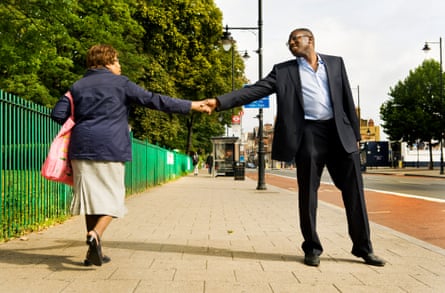
But obviously recent Labour governments – and current Labour councils – are not exempt from that philosophy. Does he regret how that distrust of local agency was allowed under the Blair and Brown governments in which he was a minister?
“In the Blair years we saw an expansion in public services, the NHS and education in particular,” he says. “But yes, local government was the Cinderella and we did not make any of the commitments to social housing that we should have done.”
Does he remember even debates about any of that failure?
“I do,” he says, with an ironic laugh. “But they were fringe discussions being had by people like Jeremy Corbyn.”
The dreadful events at Grenfell Tower have inevitably looked like the grimmest coda to the narrative that began with Theresa May calling the general election and that took in the terrorist atrocities that followed. The result of all those events – weeks in which Lammy, like many engaged politicians, has endured long days and little sleep – is that elected members have woken up blinking at a very different reality. Lammy was partly responsible for electing Jeremy Corbyn, his neighbouring MP, to the leadership. (“After the 2015 defeat,” he recalls, “he asked me to nominate him for the foreign affairs committee. I said I would and then 10 days later he came and said, I am actually running for the leadership, would you nominate me for that instead? So I did that instead.”)
He claims to have never regretted it, though I guess it is much easier for him to say that now. He admits that he didn’t quite expect the shift in fortunes that occurred, and underestimated his leader’s faith that the party could unlock the spirit of “the many” as a political force so quickly.
“I knew that appetite for the end of austerity existed in our cities,” he says, “but the election proved it goes beyond that now. People want the social back. They are clear that you cannot contract everything out. The private sector has to be the engine of our economy, but there is also a role for the state. What these events have shown is that regulation is what we have learned from crisis over the years; most of our challenges come from deregulation. Deregulation caused the 2008 financial crash, and at Grenfell I think we will find deregulation, or a failure to implement regulation, too.”
For all these reasons, Lammy is convinced that the combination of the election and the faultlines in society revealed by the conflagration now makes a Labour government likely “sooner rather than later”. He admits though there is much work be done. That the party still needs to offer some hope to the “white working-class man in Dagenham, that he can be a productive part of a new economy”. He also believes fervently that all this would be better achieved within the EU – and certainly the single market – than outside it. But he also thinks that the mood for “the social” is unstoppable.
Where does Lammy see himself in this new landscape?
“I have turned down jobs in the shadow cabinet; I have also been overlooked for several jobs in the shadow cabinet,” he says. “I don’t care which branch of the Islington mafia is running the Labour party, I will always try to be my own man. People used to ask, Blair or Brown? I would say no, just black. That is who I am.”
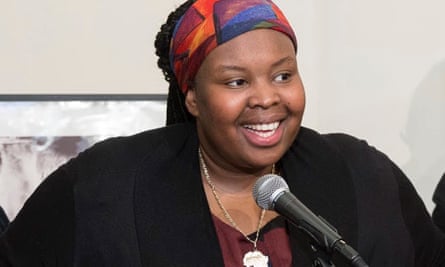
The last time I talked to Lammy was on the occasion of the death of Professor Stuart Hall, the prime mover of multiculturalism, who had been his mentor. Part of the understanding of any event in our society still has to involve race, he believes. “In the end I am a black man in Britain,” he says. “I am judged in those terms every time I open my mouth. Some people think I am too posh. Many people say I am ‘too passionate’ when I speak, and we all know what really lies behind that…”
The implication that a black man cannot quite control his emotions?
“Exactly.”
“Passionate” is no doubt the word that came into many viewers’ heads as they watched Lammy speaking out on Newsnight. But you couldn’t help also feeling, perhaps, a sense of an ambitious politician seizing his moment; Lammy knows from experience that finding the edge of controversy can be a powerful way of using his platform to make a difference.
When I speak to Lammy the morning after that interview, on the phone as he makes his way by car to the funeral of Khadija Saye, he is unrepentant about stirring suspicions of a cover-up. The story of Grenfell Tower, as he feared, was in danger of becoming a technical discussion of compliance and cladding and polyethylene – and the heat of the political dimension of those issues was getting lost.
“I have always seen my primary job [as being] to represent my constituents or people like them,” he said. “If that means I don’t sound quite like I am meant to sound, that I don’t use the language that the political class are meant to deploy in these circumstances, then so be it. As I said, I don’t think Grenfell Tower is a tragedy. I know it is a crime. I won’t stop saying so.”
Half an hour before we spoke, the news had come through that the Crown Prosecution Service would charge six people with criminal offences over the Hillsborough disaster in 1989. Lammy had immediately taken to Twitter to quote Martin Luther King: “The arc of the moral universe is long, but it bends toward justice.” Does he hope that example will concentrate attention and resources on Grenfell as a criminal investigation as well as an inquiry?
He does, but he believes that if it is not to take 28 years to get justice, then the surest guarantee is for people like him to continue to voice the concerns of those who have suffered most.
“Theresa May told me last week, in answer to my question, that she cannot give a running commentary on a police investigation,” he says. “But when we had the investigations of phone hacking and the paedophile cases after Jimmy Savile, the police seemed only too keen to take cameras with them into buildings, seizing material, arresting people.”
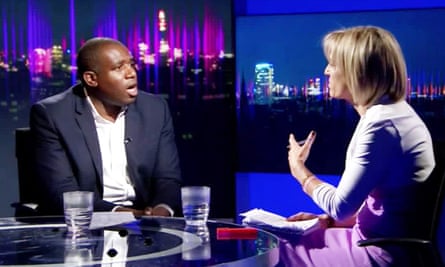
All he is asking for is the same approach in investigating a case that “should be at least on a par with those”. He wants to know if documents have been seized from contractors or local authorities. How many officers are engaged, all of that.
“Last night Emily Maitlis asked me how many people I think died. I don’t know! How could I possibly know? But I do know that I have been down there to talk to survivors now numerous times, and that the government and the police need to hear what they are saying. They want to know how the figure of 79 was reached. They want to know how many people are still missing, what exactly is being done to find out. I think we all need to know that.”
His mention of “dozens” of people jumping from the building, of anecdotes of 40 people in individual flats – was that corroborated in any way?
“You don’t hear the same thing from all people. But it is for the police to throw some light on all those descriptions, and for journalists to. I am reporting what people are saying.”
And his role is to amplify those voices even at the risk of spreading unconfirmed reports?
“Look,” he says, “the police rang me yesterday. The head of the investigation told me they would be updating their statements around this [an updated statement was later made, raising 79 and 80 and suggesting that it might take until the end of the year to find out the true number of casualties]. That is why you raise issues. I can force progress on those things. I raised the question of criminal investigation with the prime minister in parliament and the next day we got a statement from the police.”
Lammy has no idea at all whether there is a cover-up going on. But he does know very well that cover-ups have gone on before. And so he will keep up that effort to voice the fears of those closest to the tragedy.
“It’s a bit like when you are writing a book,” he argues. “You can’t self-edit in the first draft. You have to say what you feel and what you see and then hopefully an editor might come in and say you can’t say that, or that’s not quite right. I am not self-editing.”
He is also, as he doesn’t need to remind me, in a car on the way to the funeral of a young woman who died in the most horrible and avoidable circumstances and who was his friend. He doesn’t feel much like being diplomatic, or cautious and, as the slow work of the inquiry grinds through its gears, he doesn’t imagine he will be any time soon.
“I am speaking up,” he says. “And I am going to keep on speaking up.”
